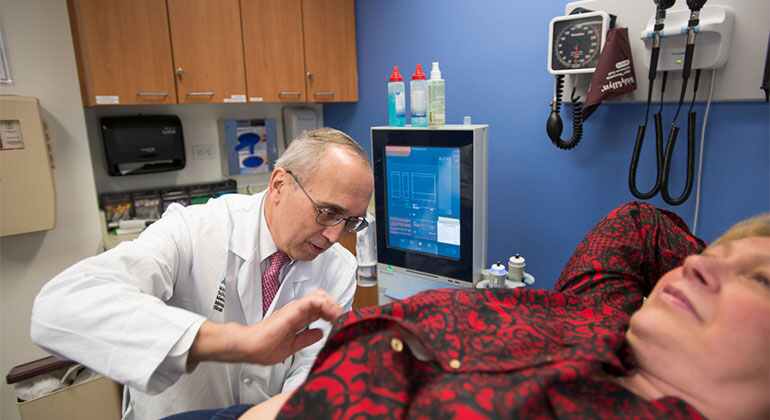Hepatitis C

You may not know you have hepatitis C because symptoms can be subtle and can take years to surface. Today, the Centers for Disease Control and Prevention recommend that anyone over 18 years of age be tested for hepatitis C. A simple blood test will let you know if you have the virus.
About Hepatitis C
Hepatitis C is the most common liver disease and the most widespread cause for liver transplantation in the United States. Hepatitis C is a slow-progressing virus that causes advanced liver disease over time and can lead to death if not treated. Each year in the United States, 12,000-14,000 people die from hepatitis C complications.
Unlike in the case of hepatitis A and hepatitis B, there is no vaccine to prevent hepatitis C. However, early detection and treatment of hepatitis C can give you the best possible outcome.
Our doctors and staff are experts in the diagnosis and treatment of hepatitis C. If you think you may be at risk, we urge you to schedule an appointment so we can test you. Our dedicated staff treats you with compassion and courtesy.
Symptoms of Hepatitis C
Hepatitis C is often called the hidden or silent killer because by the time you have symptoms, you may already be at the point of having very advanced liver disease and may need a liver transplant.
Hepatitis C symptoms are rare, but the most common is fatigue. You may have a yellow cast to your skin and eyes (jaundice), as well as mild to severe flu-like symptoms.
Baby Boomers and Hepatitis C
We do not fully understand why baby boomers are five times more likely to have hepatitis C than any other age group. But deficiencies in the health care system and lifestyle choices during the 1970s and 1980s made infection more likely when baby boomers were young adults. Rates of hepatitis C were the highest during those decades, before the virus was discovered. At the time, before widespread screening of the blood supply for the virus began in 1992, when universal precautions were adopted, exposure could occur through contaminated blood and blood products. Infection was also possible due to contaminated recreational intravenous or intranasal drugs, if used even once in the past.
You could have hepatitis C and live for decades with no symptoms or with symptoms that have no specific cause. Hepatitis C symptoms can be associated with the aging process and may be overlooked by those experiencing them, such as fatigue, joint pains, and itchy skin.
Today, many baby boomers are unknowingly living with an infection they got many years ago. Unfortunately, the longer you live with the hepatitis C virus, the more likely you are to develop serious, life-threatening liver disease.
Should You Be Tested for Hepatitis C?
The U.S. Centers for Disease Control and Prevention and the United States Preventive Services Task Force recommend that if you are older than 18 years of age, you should be tested for hepatitis C.
Contrary to common belief, anyone can get hepatitis C—not just intravenous (IV) drug users. Hepatitis C is a blood-borne viral infection. All it takes is blood-to-blood exposure for you to be at risk for contracting the hepatitis C virus.
The good news is that a simple blood test will let you know if you have the virus. If you discover it early, the chances of a cure are extremely high.
Risk Factors for Hepatitis C
If you have just one risk factor or a combination of risk factors for hepatitis C, routine screening is important.
To help you decide if hepatitis C screening is appropriate for you, let your doctor know about your concern, especially if you:
- Had unsafe injections
- Had a blood transfusion, dialysis, or organ transplantation before 1992
- Have an HIV diagnosis or elevated liver enzymes of unknown origin
- Lived in a geographic region where the hepatitis C virus is prevalent
- Received tattoos from unlicensed tattoo parlors or manicures and pedicures with tools that haven’t been properly sterilized and cleaned
- Shared personal care items, such as razors or toothbrushes, which may have contained the blood of another person who may have hepatitis C
- Used illicit drugs via injection or the nose
- Were born to a hepatitis C virus-infected mother
In addition, health care workers may be at risk following a needle stick injury while treating someone with hepatitis C.
If you think you may be at risk, we urge you to be tested.